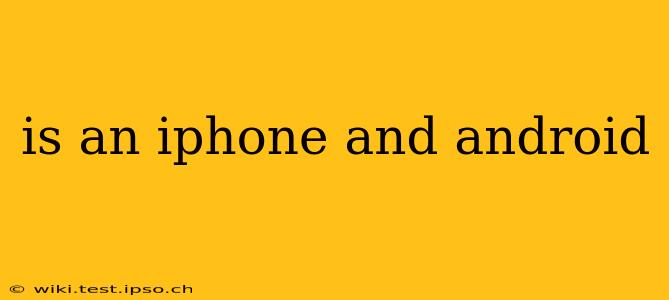iPhone vs. Android: A Deep Dive into the Smartphone Showdown
The age-old question: iPhone or Android? For years, this debate has raged among tech enthusiasts and casual users alike. Both platforms offer powerful smartphones with a multitude of features, but significant differences exist in their operating systems, ecosystems, and overall user experiences. This comprehensive comparison will help you decide which phone best suits your needs and preferences.
We'll explore the key distinctions across various aspects, answering many of the questions people commonly ask when choosing between these mobile giants.
What are the main differences between iPhone and Android?
The core difference lies in the operating systems. iPhones run on iOS, developed and maintained solely by Apple. This provides a highly integrated and controlled experience. Android, on the other hand, is an open-source operating system developed by Google, and it's used by numerous manufacturers like Samsung, Google, OnePlus, and many others. This leads to a greater diversity of hardware and software options, but can sometimes result in inconsistencies across devices.
Beyond the OS, key differences encompass:
-
Ecosystem: Apple’s ecosystem is tightly integrated. iPhones seamlessly connect with Macs, iPads, and other Apple devices through iCloud and other services. Android offers integration with other Google services, but the level of interoperability varies across different manufacturers and devices.
-
App Stores: Both platforms have vast app stores, but the apps themselves can differ. While many popular apps are available on both, some are exclusive to one platform or another. iOS apps often have a reputation for being more polished and consistently updated due to Apple's stringent app review process.
-
Customization: Android offers significantly more customization options. Users can change launchers, widgets, and various system settings to personalize their experience. iOS provides limited customization, focusing on a more streamlined and user-friendly interface.
Which is better for gaming?
Both platforms offer extensive game libraries. However, the "better" platform depends on individual preferences and the specific games you enjoy. High-end Android devices often boast more powerful processors, potentially leading to smoother performance in graphically demanding games. However, iOS often receives game updates sooner and enjoys a reputation for smoother, more optimized gameplay in some titles. Ultimately, it's often a matter of the specific game and your personal experience.
Is Android or iPhone more secure?
Both iOS and Android have robust security features, continuously updated to address emerging threats. However, iOS often gets praised for its tighter control over the software ecosystem, which can make it less susceptible to malware. Android, being more open, requires users to be more vigilant in downloading apps only from trusted sources. Ultimately, the security of your phone depends not only on the operating system but also on your personal security practices.
Which phone has better battery life?
Battery life varies greatly across individual models, not just the platform. A high-end Android phone might have better battery life than a budget iPhone, and vice versa. Factors like screen size, processor, and usage patterns heavily influence battery performance. It's crucial to look at individual phone reviews and specifications to determine battery life for specific models.
Which is cheaper?
Generally, Android phones offer a wider range of price points, including many budget-friendly options. iPhones tend to be positioned at the higher end of the market, though there are exceptions. Therefore, if budget is a primary concern, Android phones often provide more choices.
Is Android easier to use than iPhone?
Ease of use is subjective. iOS is often praised for its intuitive interface and straightforward design. Android's customization options can lead to a steeper learning curve for some users. However, many find Android's flexibility beneficial, allowing them to tailor the phone precisely to their preferences. The best OS for you depends largely on your tech proficiency and personal preferences.
Which phone is better for photography?
Both platforms boast impressive camera capabilities. Advances in computational photography have blurred the lines significantly. High-end models from both Apple and leading Android manufacturers like Google, Samsung, and Huawei often feature top-tier camera systems. The "better" camera ultimately depends on the specific phone model, as features and image processing techniques vary greatly.
In conclusion, the "best" smartphone – iPhone or Android – depends entirely on your individual needs and preferences. Consider your budget, desired level of customization, app preferences, and priorities regarding security and ease of use. Researching specific phone models within each platform will give you the best chance of finding the perfect device for you.
